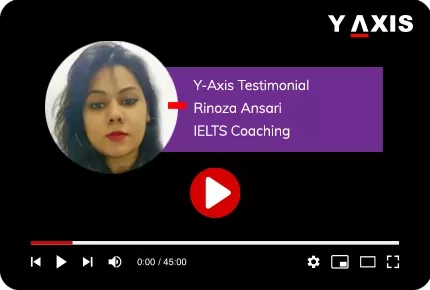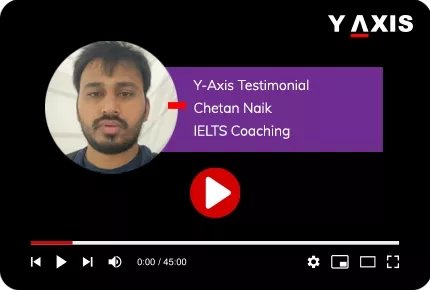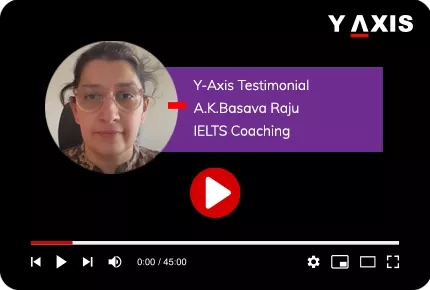The International English Language Testing System (IELTS) is one of the most sought-after standardized tests for checking an individual’s English language proficiency.
A high score in IELTS can give you an edge over other applicants and put you in the top position among applicants. Y-Axis IELTS Coaching is an intensive training program designed to help you achieve your highest score in this exam.
The IELTS on-location and online coaching by Y-Axis offers expert guidance on all the four components of the test-
- Listening
- Reading
- Writing
- Speaking
The right IELTS coaching can help you achieve the score that matters!



Looking for Best IELTS Training in Dubai? Y-Axis Dubai provides online and offline coaching with the best tutors and also has its own IELTS Exam test center.
Why IELTS?
- 140 countries offer IELTS
- Over 11,500 institutions accept IELTS
- 3 million IELTS test takers every year
- Get your IELTS Test results in 3-5 days
- IELTS score report valid for two years
About IELTS exam
IELTS Exam, also known as the International English Language Testing System, is a regulated test for checking the English language proficiency of non-native English speakers.
It is one of the most preferred and popular English language tests for international migration and study abroad purposes. Over 11,000 institutions and 140 countries accept and welcome IELTS as a trusted English proficiency test.
Benefits of the IELTS test
With a positive IELTS test score, one can study, migrate, and work in English-speaking countries.
- IELTS for studies: IELTS is universally accepted and is preferred by some of the most well-known universities and study institutions across the globe.
- IELTS for Migration: Government organizations in most countries approve IELTS as a trusted English language test to grant permanent residency. The IELTS score differs based on the type of visa and its requirements.
- IELTS for Work: Foreign countries consider IELTS scores as one of the primary language proficiency requirements while recruiting skilled labour. However, the IELTS score requirement will differ based on the type of occupation.
IELTS in UAE
The International English Language Testing System (IELTS) is divided into two categories: IELTS Academic and IELTS General. Although both test a candidate’s basic English language proficiency, they have different purposes.
Given below is a detailed breakdown of IELTS Academic and IELTS General.
|
Factor |
IELTS Academic |
IELTS General |
|
Purpose |
For those who wish to pursue studies abroad. |
For those who wish to establish a career or migrate to an English-speaking country |
|
Test pattern |
Reading, writing, listening & Speaking |
Reading, writing, listening & Speaking |
|
Syllabus |
Academic-based scenarios & high-level case studies. |
basic social & environmental skills in English |
|
Who is eligible? |
Students looking to study Bachelor’s, Master’s, Post-graduation or other courses. |
IELTS Academic
IELTS Academic tests your English language proficiency and checks whether it is sufficient for an academic background. It is usually taken by students who wish to pursue studies abroad.
| Listening | Reading | Writing | Speaking | |
| Duration | 30 minutes + 10 additional minutes | 60 minutes | 60 minutes | Not specified |
|
Format |
Four audio recordings in varying accents. |
Three long reading passages with tasks (including diagrams, graphs or illustrations) |
One written task to describe, explain or summarise text or diagrams (minimum 150 words) | You will take the Video-call Speaking test at an official IELTS test centre with the same high standard of identity verification. The test will be exactly the same as the in-person Speaking test in terms of content, scoring, timing, question format and security arrangements. |
|
The answers must be in the form of: |
One essay task (minimum 250 words). | |||
| The Reading section consists of 40 questions designed to test a wide range of reading skills. These include skim reading, reading for main ideas, reading for detail, understanding logical arguments and recognising writers’ opinions, attitudes and purpose. |
Topics are of general interest to, and suitable for, test takers entering undergraduate and postgraduate studies or seeking professional registration. There are two tasks: Task 1 – you will be presented with a graph, table, chart or diagram and asked to describe, summarise or explain the information in your own words. You may be asked to describe and explain data, the process stages, how something works or describe an object or event. Task 2 – you will be asked to write an essay in response to a point of view, argument or problem. Responses to both tasks must be in a formal style. |
Delivered by an IELTS Speaking Examiner, the Video-call Speaking test will maintain the face-to-face features of the in-person Speaking test. |
||
|
This section includes three long texts, which range from factual information to discussion pieces and analysis. These are taken from books, journals, magazines and newspapers. They have been selected for a non-specialist audience but are appropriate for people entering university courses or seeking professional registration. Check for the details of IELTS exam registration in UAE. |
||||
|
|
||||
|
You will listen to four recordings of native English speakers and then write your answers to a series of questions: Recording 1 is a conversation between two people in an everyday social context. |
IELTS General
IELTS General tests your English language proficiency and checks if you are proficient enough with day-to-day language. IELTS General is usually taken up by candidates who wish to work in an English-speaking country.
| Listening | Reading | Writing | Speaking | |
| Duration | 30 minutes + 10 additional minutes | 60 minutes | 60 minutes | Not specified |
| Format | 4 audio recordings in varying accents. You will write your answers using: | Three reading passages with tasks: | Letter writing task (minimum 150 words) | Face-to-face interview. |
| Section 1 – two short or three short factual texts | Short essay writing task (minimum 250 words). | Short questions and speaking at length about a familiar topic. | ||
| multiple choice | Section 2 – two short work-related, factual texts | Topics are of general interest. There are two tasks: | Please note: Depending on the test centre location, you may be required to book the Speaking section of your test on a different day. | |
| matching points | Section 3 – one longer text on a topic of general interest | Task 1 – you will be presented with a situation and asked to write a letter requesting information or explaining the situation. The letter may be personal, semi-formal or formal in style. | The Speaking section assesses your use of spoken English. Every test is recorded. | |
| diagram labelling | The Reading section consists of 40 questions designed to test a wide range of reading skills. These include reading for main ideas, reading for detail, skimming, understanding logical argument and recognising writers’ opinions, attitudes and purpose. | Task 2 – you will be asked to write an essay in response to a point of view, argument or problem. The essay can be fairly personal in style. | Part 1 – the examiner will ask you general questions about yourself and a range of familiar topics, such as home, family, work, studies and interests. This part lasts between four and five minutes. | |
| sentence completion | This includes extracts from books, magazines, newspapers, notices, advertisements, company handbooks and guidelines. These are materials you are likely to encounter on a daily basis in an English-speaking environment. | Part 2 – you will be given a card which asks you to talk about a particular topic. You will have one minute to prepare before speaking for up to two minutes. The examiner will then ask one or two questions on the same topic. | ||
| You will listen to four recordings of native English speakers and then write your answers to a series of questions. | Part 3 – you will be asked further questions about the topic in Part 2. This will give you the opportunity to discuss more abstract ideas and issues. This part of the test lasts between four and five minutes. | |||
|
|
Recording 1 – a conversation between two people set in an everyday social context. |
|||
| Recording 2 – a monologue set in an everyday social context, e.g. a speech about local facilities. | ||||
| Recording 3 – a conversation between up to four people set in an educational or training context, e.g. a university tutor and a student discussing an assignment. | ||||
| Recording 4 – a monologue on an academic subject, e.g. a university lecture. |
IELTS Registration
You can register for the IELTS via two modes at your convenience.
You can follow the simple steps given below to register for IELTS Training in Dubai:
Step 1: Choose a mode to apply.
Locate the nearest IELTS centre or apply for it online. You can find the local IELTS centre or book an appointment via the official website.
Step 2: Register for the test.
You can either register and pay online or download the application and submit it at the nearest test centre.
Step 3: Test confirmation.
Upon processing the application, the test centre will send you a confirmation email stating the date and time of the test.
Note: The Speaking Test is sometimes conducted the same day or seven days before or after the other tests.
IELTS exam fee
The cost of the IELTS test is usually between 1340 AED and 1395 AED, depending on the type.
The detailed cost of IELTS is mentioned below:
| Type of Test | Fees |
| IELTS Academic | 1340 AED |
| IELTS General Training | 1340 AED |
| UKVI IELTS Academic | 1395 AED |
| UKVI IELTS General Training | 1395 AED |
IELTS results
The IELTS results are generally released within three days to 13 days, based on the mode of application.
- Time taken for results of computer-based IELTS test: 3-5 Days
- Time taken for results of paper-based IELTS test: 13 days
Other Coaching services
How can Y-Axis help you?
Y-Axis, UAE’s top overseas immigration company, now has registered test centers in Dubai!
You no longer have to go through the hassle of hunting down a venue in the UAE. Come and receive top-notch IELTS prep with our IELTS free coaching services.
We will assist you with the following things:
- Get help finding the exam dates in UAE.
- Get guidance in booking a slot for your test.
- Get assistance with the fee payment process.
- Get personalized updates on IELTS coaching exam fees in Dubai and other notifications.
{
"@context": "https://schema.org/",
"@type": "BreadcrumbList",
"itemListElement": [{
"@type": "ListItem",
"position": 1,
"name": "Home",
"item": "https://www.y-axis.ae/"
},{
"@type": "ListItem",
"position": 2,
"name": "Coaching",
"item": "https://www.y-axis.ae/coaching/"
},{
"@type": "ListItem",
"position": 3,
"name": "Ielts",
"item": "https://www.y-axis.ae/coaching/ielts/"
}]
},
{
"@context": "https://schema.org",
"@type": "FAQPage",
"mainEntity": [{
"@type": "Question",
"name": "Where can I study IELTS in UAE?",
"acceptedAnswer": {
"@type": "Answer",
"text": "Y-Axis, UAE’s top immigration company, has one of Dubai’s leading IELTS test centers. Y-Axis has been providing IELTS coaching and training services for over 24 years and is one of the best IELTS test providers in the UAE. Y-Axis provides assistance in test slot booking, fee payment process, and more by sending regular updates to our clients."
}
},{
"@type": "Question",
"name": "What is the validity of IELTS?",
"acceptedAnswer": {
"@type": "Answer",
"text": "Once taken, the IELTS test is valid for two years, and the candidate can retake the test upon expiration of the IELTS test."
}
},{
"@type": "Question",
"name": "How often can I retake the IELTS exam?",
"acceptedAnswer": {
"@type": "Answer",
"text": "IELTS has no restrictions on the number of times the test can be taken. One can retake the IELTS test as many times as they want and use the result of their choice. However, it is always advisable that the candidate does thorough research and preparation before attending the IELTS exam to get a good band score."
}
},{
"@type": "Question",
"name": "How long should I wait before retaking the IELTS test?",
"acceptedAnswer": {
"@type": "Answer",
"text": "Candidates who are not satisfied with their IELTS test results in the first attempt can reapply for the IELTS exam again. Candidates usually reapply for the IELTS test 15 days after receiving the test results of the first attempt."
}
},{
"@type": "Question",
"name": "What is considered a good IELTS score?",
"acceptedAnswer": {
"@type": "Answer",
"text": "IELTS is scored on a scale of 0-9, with 0 being the least and 9 being expert-level proficiency. However, a band score of 7 or more is considered a good IELTS score. Most universities abroad consider a band score of 6.5 to 7 as a good IELTS score for study admissions."
}
},{
"@type": "Question",
"name": "Is there eligibility for IELTS?",
"acceptedAnswer": {
"@type": "Answer",
"text": "The only eligibility criteria for IELTS are for candidates at least 16 years of age."
}
}]
}
]